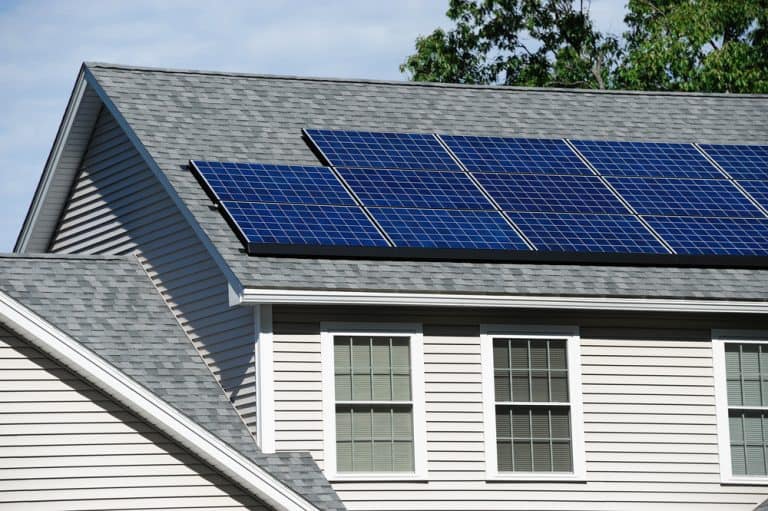Generators vs Solar Powered Battery Backup

There are several different energy storage solutions. Not all these solutions, however, are ideal for homeowners.
Currently, two competitors have piqued the interest of energy-conscious homeowners. These competitors include generators and battery backup in conjunction with solar.
Solar Battery Backup Options
Because of the way solar panels work, an array needs additional equipment to store excess solar energy. Solar arrays also need a storage solution because the NEC requires solar arrays to shut off during an outage, making them useless without a backup solution.
For a long time, net metering was the preferred solar storage solution. Net metering, however, doesn’t store energy. It directs the excess solar energy onto the grid for others to use and credits it to the customer’s utility bill for that month.
Net metering allows homeowners to utilize all their energy, but it doesn’t solve all the issues. Without a backup solution, solar arrays can’t give homeowners the energy independence that solar promises.
The most promising residential solution is battery backup. The two most popular types of battery backup on the market right now include home battery backup and emergency battery backup.
Emergency Battery Backup Power
Emergency battery backup allows people with smaller energy needs to have power continuity. This battery backup option is meant to keep essentials running during an outage. This option is also cost-effective, making battery backup an option for more people.
Home Battery Backup Power Supply
Home Battery Backup can store enough excess solar power to keep the entire home running. Depending on the usage of the home and the number of home batteries used, the home can function for several days before a recharge is needed.
Go Solar Group’s Battery Backup Options
Go Solar Group’s focus is battery backup, which is why we carry several different battery backup options. We want every customer to have a battery backup option to fit their needs.
Types of Generators to Choose From
There are three types of traditional generators for homeowners. These include home standby generators, portable generator and inverter generators.
Some consider portable battery backup solutions generators. However, because this backup option doesn’t use traditional methods to generate electricity, it isn’t included as a generator here.
Traditional generators have a motor that runs on fuel. Let’s take a closer look at what makes these three generator types different from each other.
Home Standby Generators
Home standby generators connect to the home using an automatic transfer switch. This switch starts the generator during an outage and shuts off when the grid is working. These generators are larger units built to supply power for the entire home for several days.
Portable Generators
Portable generators are smaller generator units that can move to different locations. They, however, can not be inside an enclosed space or near the home because of the fumes that they put out.
Inverter Generators
Inverter generators are also small portable units. What sets them apart from portable generators is that they run quieter and produce less toxic fumes. However, it is still not recommended to run them in an enclosed space.
Determining Which Backup Solution to Use
Which storage option to use depends on the priorities of the homeowner.
Some people value a cheaper solution. Others are willing to pay more for solutions that outperform the competition. Then other people want a solution that will cut down on their carbon footprint.
The Price of Battery Backup vs. Generators
Generators can range from a couple hundred to several thousand, not including installation, maintenance and fuel costs. These costs depend on the type of generator, the fuel it uses, and the amount of electricity it will produce.
Battery backup also can range anywhere from a couple hundred to several thousand. Typically, battery backup costs more. However, there also aren’t fuel or maintenance costs.
Expected Performance of Generators and Battery Backup
Generators have warranties between 1,000 to 2,000 hours. However, how long the generator will last is dependent on placement, maintenance performed, and the frequency of use.
Battery backup units often have battery cycle warranties. The cycle warranty for a battery could be anywhere from 2500 to 7500 cycles.
How many years this translates into depends on battery use and its extream temperature exposure. However, these batteries typically last between 5 and 15 years.
The Most Energy Efficient Option
The efficiency of storage products is becoming an important factor for buyers. Among generator options, some use more efficient fuels. However, none of them compare to solar-paired battery backup.
Why Go Solar Group Prefers Battery Backup
As a solar company, it makes sense to supply the storage option with the smallest carbon footprint. However, that isn’t the only reason we only carry battery backup options. Battery backup is also quite, can be indoors, doesn’t have starting issues, doesn’t cost extra for the fuel, and doesn’t require regular maintenance.



Send a Message
Oops! We could not locate your form.